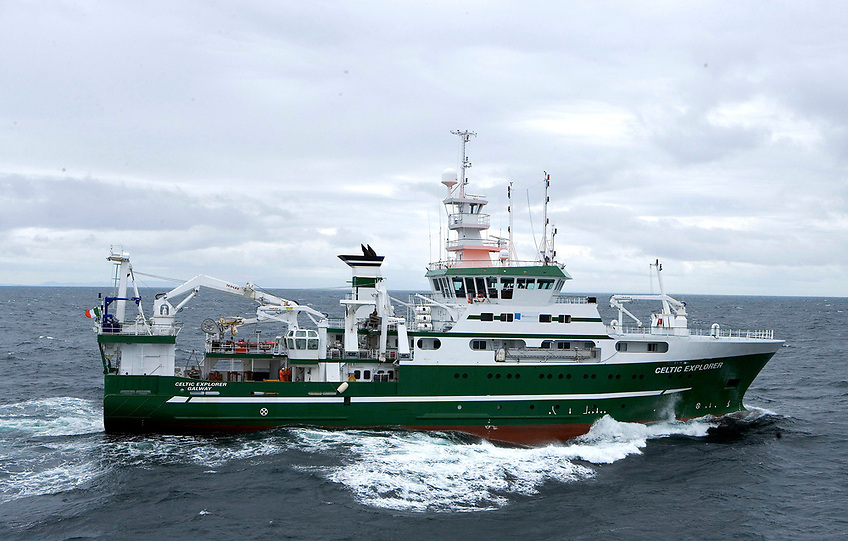With an investment of €2.6 million under the Marine Institute’s 2021 Blue Carbon call, two Irish research teams led by Dr Grace Cott and Dr Mark Coughlan of University College Dublin, will undertake a substantial programme of research to investigate how Ireland’s marine habitats store carbon and potentially reduce carbon dioxide concentrations in the atmosphere. This flagship award by the Marine Institute is co-funded with contribution of €400,000 by the Environmental Protection Agency (EPA).
‘Blue Carbon’ refers to the uptake of carbon dioxide from the atmosphere by natural marine and coastal habitats in a way that can be quantified. This is a critical ecosystem service which helps to reduce the extent and speed of climate change caused by greenhouse gas emissions from human activities.
The five-year programme of research will improve our understanding of how Ireland’s Blue Carbon habitats, which include coastal salt marshes and seagrass beds, can mitigate climate change. The research will also investigate the substantial carbon sequestration capacity of seabed sediments which are challenging to quantify. The successful projects, (BlueC and Quest), will deepen our understanding of the carbon dynamics in Irish marine ecosystems and assess their capacity to be integrated into climate policy.
This is research that is specifically targeted to inform policy and regulation. It will provide knowledge and evidence to assist with Ireland’s goal of attaining 51% reduction in greenhouse gas emissions by 2030 and improve our capacity to meet broader Irish and international climate and biodiversity targets.
In line with a commitment under the current Programme for Government, the research will also inform the appropriate and effective development, regulation and use of Marine Protected Areas, and broader marine spatial planning and management frameworks including the National Marine Planning Framework.
Dr Paul Connolly, CEO of the Marine Institute said, “This research will be extremely important in generating a much greater understanding of how Ireland’s marine and coastal systems act as a key carbon sink to mitigate against climate change. The ability to quantify the uptake and storage of atmospheric carbon by marine habitats such as salt marshes and seagrass beds could be key in helping to meet national and European climate adaptation and mitigation policy goals. This project is also important in the context of meeting EU nature restoration targets for those habitats that can capture and store carbon and prevent and reduce coastal erosion and flooding.”
According to Dr Grace Cott, University College Dublin and Principal Investigator in the BlueC project, “ocean and coastal marine systems play a significant role in the global carbon cycle, representing the largest long-term sink of carbon. Ireland has two Blue Carbon habitats; saltmarsh and seagrass meadows, and a vast marine territory containing potential Blue Carbon systems, such as carbon-rich macroalgae, maërl, cold water corals, phytoplankton and sediments. Specifically, for Ireland, there is a paucity of data on the carbon storage capacity of these ecosystems, and a lack of coherent management strategies that hampers our ability to integrate these ecosystems into climate policy frameworks.”
Working with project partners NUI Galway and University College Cork, the overarching aim of BlueC is to advance scientific understanding of the carbon dynamics in Irish coastal and marine environments, whilst simultaneously improving management and harnessing their potential for climate mitigation, adaptation and other ecosystem services to underpin policy development. Dr Cott emphasises that engagement with stakeholders will be a key goal throughout the project in addition to building national capacity for Blue Carbon research across disciplines. A key deliverable from this project will be a validated national inventory of the carbon storage capacity of Blue Carbon habitats which will enable inclusion in National Inventory Greenhouse Gas reporting to the United National Framework Convention on Climate Change.
Dr Mark Coughlan, also of University College Dublin and Principal Investigator in the Quest project, says, “Ireland’s expansive marine resource has the potential to sequester and store significant amounts of carbon in seafloor sediments and the habitats they support.”
He explains the challenge he and his partners are trying to address, “there is a scarcity of data and information on the past and present stock of carbon in seafloor sediments. At the same time, Ireland’s seabed is coming under increased pressure from direct human activities which add to the impacts of climate change itself. To fully understand, and effectively manage the seabed in terms of maximising this Blue Carbon potential, requires a thorough understanding of carbon cycling in the marine environment over time, physical processes at the seafloor and high-quality spatial mapping.”
The Quest project team (a collaboration between University College Dublin, Dublin City University and the Geological Survey of Norway) comprises experienced and skilled researchers in these areas who will conduct a multidisciplinary programme of research to qualify and quantify stocks of carbon in Irish marine sediments, examine and characterise threats to Blue Carbon in these settings and support the development of long-term management strategies. This will include supporting the designation of Marine Protected Areas (MPAs) and facilitate the delivery of the Government’s Climate Action Plan. The Quest project also intends to engage with stakeholders and the public to achieve a better understanding of Blue Carbon across society, and to raise the visibility of such research at a national and EU level.
The BlueC and Quest projects are due to commence in June 2022, and the two teams are looking forward to sharing their research findings as widely as possible over the next five years.
The Blue Carbon Research Programme is carried out with the support of the Marine Institute and the Environmental Protection Agency funded by the Irish Government.
































































